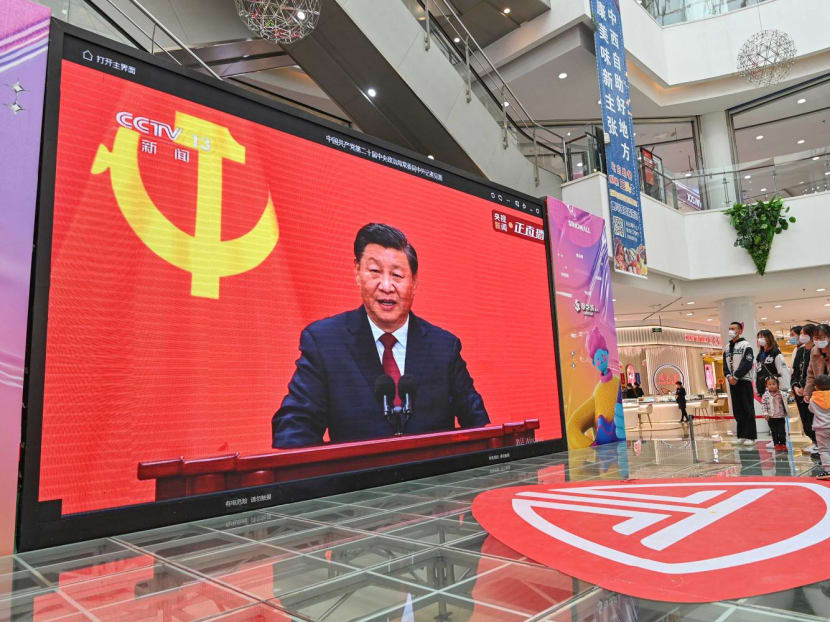China’s wealthy activate escape plans as Xi Jinping extends rule
SEOUL — Wealthy Chinese are pulling the trigger on exit plans from their homeland as pessimism builds over the future of the world’s second-largest economy under President Xi Jinping and the ruling Chinese Communist Party (CCP).

People watching a live broadcast of China's President Xi Jinping speaking during the introduction of the Communist Party of China's Politburo Standing Committee, at a shopping mall in Qingzhou, on Oct 23, 2022.
SEOUL — Wealthy Chinese are pulling the trigger on exit plans from their homeland as pessimism builds over the future of the world’s second-largest economy under President Xi Jinping and the ruling Chinese Communist Party (CCP).
At the weekend, Mr Xi cemented his position as the most powerful leader since Mao Zedong, staying on as head of the CCP and its powerful central military commission for another five years.
Following the quinquennial CCP congress, the 69-year-old now has an ironclad grip on power and the potential to rule for the rest of his life.
Mr David Lesperance, a Europe-based lawyer who has worked with wealthy families in Hong Kong and China, says Mr Xi extending his rule beyond two terms is a tipping point for China’s business elite, who thrived for decades as China’s economy boomed.
“Now that ‘the chairman’ is firmly in place . . . I have already received three ‘proceed’ instructions from various ultra-high net worth Chinese business families to execute their fire escape plans,” said Mr Lesperance.
In the months leading up to the congress, there had been speculation that Mr Xi was under pressure inside the 97-million-member CCP to pivot from controversial policies, including his zero-Covid controls, support for Mr Vladimir Putin and reassertion of party control across the business landscape.
However, Mr Kia Meng Loh, a senior partner at Dentons Rodyk, a Singapore law firm which has 6,000 employees in China, said inquiries and instructions for setting up “family offices” — private entities used to manage a family’s wealth — had also been building in the city-state “for months”.
“The clients I work with saw (Mr Xi’s) third term as a foregone conclusion much earlier than this week,” Mr Loh said.
He added that Hong Kong, long a favoured destination for Chinese wealth and elite families, had become less attractive as Beijing increased control over the territory.
The number of family offices in Singapore jumped fivefold between 2017 and 2019, and almost doubled from 400 at the end of 2020 to 700 a year later, according to Citi Private Bank.
Mr Ryan Lin, director of Singapore-based Bayfront Law, said he was approached by five families during China’s party congress last week to establish a Singapore family office, three of which are proceeding.
Mr Lin, who has set up around 30 family offices in Singapore in the past year, said most Chinese hoped to relocate there, as well as move their money.
Mr Lesperance said many of his clients spent years preparing their exit from China, legally moving capital to safe offshore jurisdictions and arranging alternative residences and new citizenships outside China for their families.
China’s rich, he said, are not only worried about rumours of an official wealth tax that would replace informal “common prosperity” donations. They are also increasingly concerned for their personal safety, even once they have left.
Those fears have deepened following a series of temporary or longer term disappearances of high-profile people from public view over recent years, including Alibaba founder Jack Ma, tennis star Peng Shuai, elite financier Xiao Jianhua and real estate mogul Whitney Duan.
“The family motto has always been: ‘Keep a fast junk in the harbour with gold bars and a second set of papers’. The modern equivalent would be a private jet, a couple of passports and foreign bank accounts,” Mr Lesperance says.
“That is the world we are in . . . it is tough stuff.”
Others, however, appear less well prepared.
The founder of a US real estate platform for wealthy Chinese said he is struggling to handle the flood of inquiries as most clients were in a hurry to leave the country and had not planned carefully.
Meanwhile, immigration firms in Shanghai and Beijing have reported a spike in applications for US green cards for people with “extraordinary ability”, as the wait time is less than for investment-based green cards often used by the ultra wealthy. FINANCIAL TIMES









